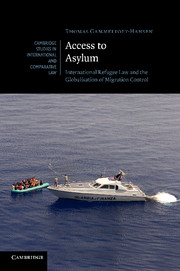Book contents
- Frontmatter
- Contents
- Foreword
- Preface
- Acknowledgements
- Table of treaties and other international instruments
- Table of cases
- 1 Introduction
- 2 The refugee and the globalisation of migration control
- 3 Refugee protection and the reach of the non-refoulement principle
- 4 Offshore migration control and the concept of extraterritorial jurisdiction
- 5 The privatisation of migration control and state responsibility
- 6 ‘Hic abundant leones’: the institutional reach of refugee protection
- 7 Conclusion
- Bibliography
- Index
- CAMBRIDGE STUDIES IN INTERNATIONAL AND COMPARATIVE LAW
- References
1 - Introduction
Published online by Cambridge University Press: 03 May 2011
- Frontmatter
- Contents
- Foreword
- Preface
- Acknowledgements
- Table of treaties and other international instruments
- Table of cases
- 1 Introduction
- 2 The refugee and the globalisation of migration control
- 3 Refugee protection and the reach of the non-refoulement principle
- 4 Offshore migration control and the concept of extraterritorial jurisdiction
- 5 The privatisation of migration control and state responsibility
- 6 ‘Hic abundant leones’: the institutional reach of refugee protection
- 7 Conclusion
- Bibliography
- Index
- CAMBRIDGE STUDIES IN INTERNATIONAL AND COMPARATIVE LAW
- References
Summary
The questions of extraterritoriality
Encountering the state
When does a refugee encounter the state? The straightforward answer to this question would be: when arriving at the border and surrendering him- or herself to the authorities, uttering the magic word, ‘asylum’. Reality, however, seldom fits this picture. First of all, a substantial number of asylum-seekers only make their claim some time after actually entering the country of prospective asylum. Second, and more importantly, the last decades have seen a number of policy developments to extend migration control well beyond the borders of the state.
A person seeking asylum in, for example, Europe or the United States may thus encounter the authorities of these countries before even departing. It could be at the consulate when attempting to obtain a visa, at the airport of key departure or transit countries where immigration officers are deployed to advise airlines and foreign authorities on whom to allow onwards passage. It could be during an attempt to cross the Mediterranean or the Caribbean seas or any one of the many other places where ships, aircraft and radar systems operate to intercept even the smallest vessel before it can reach the territorial waters of the prospective destination state.
Alternatively, the refugee may not encounter the state in persona, but rather through delegation. Under bilateral and European Union (EU) agreements, Libya and Morocco, for example, are expected to carry out exit border control in co-operation with EU member states.
- Type
- Chapter
- Information
- Access to AsylumInternational Refugee Law and the Globalisation of Migration Control, pp. 1 - 10Publisher: Cambridge University PressPrint publication year: 2011

